Corporate Finance: Risk Analysis of China, Turkey & Finland
VerifiedAdded on 2023/06/13
|13
|4017
|176
Report
AI Summary
This report provides an analysis of country risks, specifically political and financial risks, for an Irish company operating in China, Turkey, and Finland. It evaluates the political and financial landscapes of each country, highlighting potential risks such as government regulations, currency fluctuations, and political instability. The report recommends strategies for mitigating these risks, including engaging with local governments, obtaining appropriate insurance coverage, developing contingency plans, and protecting intellectual property rights. The analysis concludes that effective risk management is crucial for international businesses due to the volatility and uncertainty of foreign markets, and suggests that businesses should seek professional and legal advice to navigate the complexities of operating in these countries. Desklib offers similar solved assignments and study resources for students.
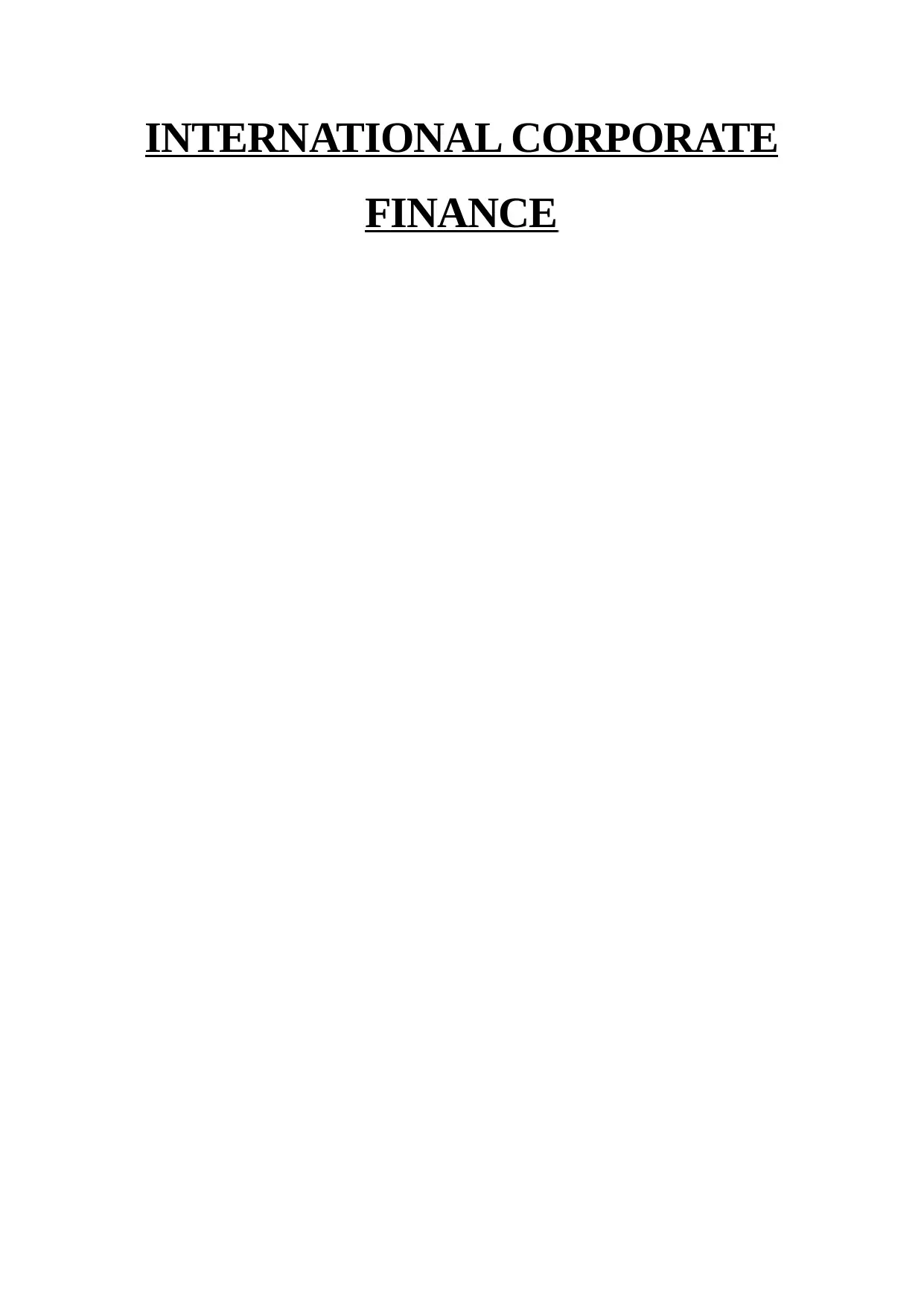
INTERNATIONAL CORPORATE
FINANCE
FINANCE
Paraphrase This Document
Need a fresh take? Get an instant paraphrase of this document with our AI Paraphraser
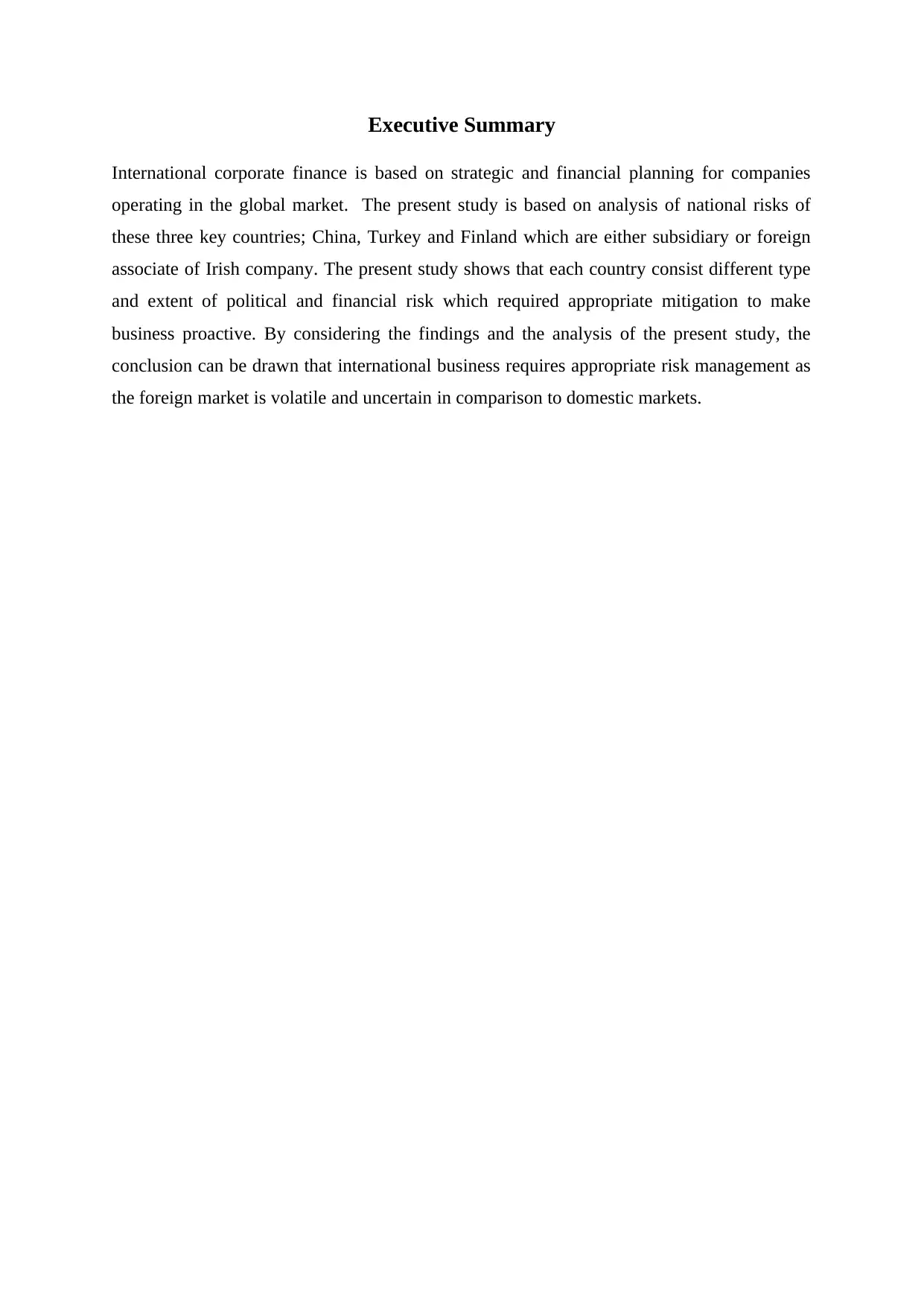
Executive Summary
International corporate finance is based on strategic and financial planning for companies
operating in the global market. The present study is based on analysis of national risks of
these three key countries; China, Turkey and Finland which are either subsidiary or foreign
associate of Irish company. The present study shows that each country consist different type
and extent of political and financial risk which required appropriate mitigation to make
business proactive. By considering the findings and the analysis of the present study, the
conclusion can be drawn that international business requires appropriate risk management as
the foreign market is volatile and uncertain in comparison to domestic markets.
International corporate finance is based on strategic and financial planning for companies
operating in the global market. The present study is based on analysis of national risks of
these three key countries; China, Turkey and Finland which are either subsidiary or foreign
associate of Irish company. The present study shows that each country consist different type
and extent of political and financial risk which required appropriate mitigation to make
business proactive. By considering the findings and the analysis of the present study, the
conclusion can be drawn that international business requires appropriate risk management as
the foreign market is volatile and uncertain in comparison to domestic markets.

TABLE OF CONTENTS
Introduction................................................................................................................................4
Definition of country risk...........................................................................................................4
Analysis for country risk and appropriate strategies for its mitigation......................................5
China......................................................................................................................................5
Strategies and recommendations............................................................................................5
Turkey....................................................................................................................................6
Strategies and recommendations............................................................................................7
Finland....................................................................................................................................8
Strategies and recommendations............................................................................................9
Conclusion................................................................................................................................10
References................................................................................................................................11
Introduction................................................................................................................................4
Definition of country risk...........................................................................................................4
Analysis for country risk and appropriate strategies for its mitigation......................................5
China......................................................................................................................................5
Strategies and recommendations............................................................................................5
Turkey....................................................................................................................................6
Strategies and recommendations............................................................................................7
Finland....................................................................................................................................8
Strategies and recommendations............................................................................................9
Conclusion................................................................................................................................10
References................................................................................................................................11
⊘ This is a preview!⊘
Do you want full access?
Subscribe today to unlock all pages.

Trusted by 1+ million students worldwide

Introduction
The present study is based on the country risks to operate a business on an international basis;
mainly there are two types of country risks which are political risks and financial risks. The
study will evaluate and analyses both these risks and the impacts of these risks on business to
operate overseas. The study will analyses country risks of these three key countries; China,
Turkey and Finland which are either subsidiary or foreign associate of Irish company. By
considering their risks, recommendations and strategies will be drawn to assist Irish company
in doing their business effectively within these cited countries.
Definition of country risk
Political risk means the complications faced by government and business which might, as a
result, affect the business in the ways of profitability or might impact expected result and the
value of economic activity. Political risk refers to a practice of political power which can
adversely impact the value of the business. Political risks can be born from several factors
which can affect the income of the company in a negative manner or can strike the business
strategies. These factors are inclusive of macroeconomic problems like high rates of interest,
social issues and government actions (Cavusgil, Knight, Riesenberger, Rammal and Rose,
2014). Political risk is a risk wherein investors, companies and government experience high
risks by the political decisions, situations or events which can considerably impact the
business profitability and the potential value of specified economic action. It can also affect
business by altering its profitability of attaining the overall business goals; it is highly
experienced by firms which can come in terms of strategic risk, personal loss, and financial
loss due to the non-market factors.
A financial risk occurs when there is a denomination in a particular currency of financial
transactions instead of the company’s base currency. The foreign exchange currency rate risk
is considered as an element of the entire financial risk for corporations that makes a
considerable amount of trade within the foreign market (Brink, 2017). Foreign exchange risks
are also present when the firm’s foreign subsidiary manages a financial statement in the form
of currency rather than the reported currency of consolidated firm. Further, the presence of
risk might create an adverse effect on the exchange rate of denominated currency in regards
to the base currency prior to the completion of transactional data. One of the main risks in
involving with international business is the exchange rates; it is the primary risk related to the
business is the fluctuations in the foreign exchange (Neelankavil, 2015). Since each country
The present study is based on the country risks to operate a business on an international basis;
mainly there are two types of country risks which are political risks and financial risks. The
study will evaluate and analyses both these risks and the impacts of these risks on business to
operate overseas. The study will analyses country risks of these three key countries; China,
Turkey and Finland which are either subsidiary or foreign associate of Irish company. By
considering their risks, recommendations and strategies will be drawn to assist Irish company
in doing their business effectively within these cited countries.
Definition of country risk
Political risk means the complications faced by government and business which might, as a
result, affect the business in the ways of profitability or might impact expected result and the
value of economic activity. Political risk refers to a practice of political power which can
adversely impact the value of the business. Political risks can be born from several factors
which can affect the income of the company in a negative manner or can strike the business
strategies. These factors are inclusive of macroeconomic problems like high rates of interest,
social issues and government actions (Cavusgil, Knight, Riesenberger, Rammal and Rose,
2014). Political risk is a risk wherein investors, companies and government experience high
risks by the political decisions, situations or events which can considerably impact the
business profitability and the potential value of specified economic action. It can also affect
business by altering its profitability of attaining the overall business goals; it is highly
experienced by firms which can come in terms of strategic risk, personal loss, and financial
loss due to the non-market factors.
A financial risk occurs when there is a denomination in a particular currency of financial
transactions instead of the company’s base currency. The foreign exchange currency rate risk
is considered as an element of the entire financial risk for corporations that makes a
considerable amount of trade within the foreign market (Brink, 2017). Foreign exchange risks
are also present when the firm’s foreign subsidiary manages a financial statement in the form
of currency rather than the reported currency of consolidated firm. Further, the presence of
risk might create an adverse effect on the exchange rate of denominated currency in regards
to the base currency prior to the completion of transactional data. One of the main risks in
involving with international business is the exchange rates; it is the primary risk related to the
business is the fluctuations in the foreign exchange (Neelankavil, 2015). Since each country
Paraphrase This Document
Need a fresh take? Get an instant paraphrase of this document with our AI Paraphraser
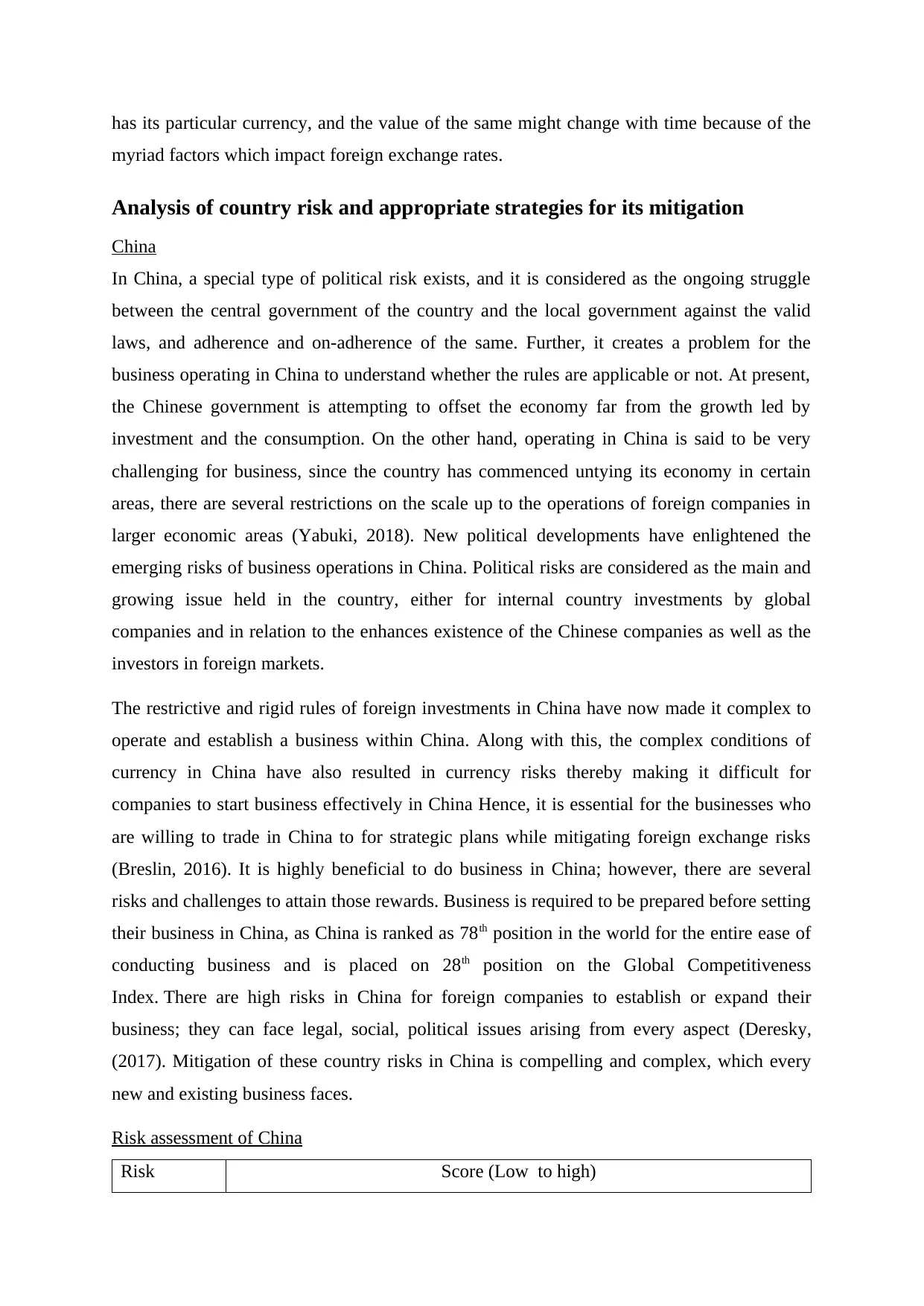
has its particular currency, and the value of the same might change with time because of the
myriad factors which impact foreign exchange rates.
Analysis of country risk and appropriate strategies for its mitigation
China
In China, a special type of political risk exists, and it is considered as the ongoing struggle
between the central government of the country and the local government against the valid
laws, and adherence and on-adherence of the same. Further, it creates a problem for the
business operating in China to understand whether the rules are applicable or not. At present,
the Chinese government is attempting to offset the economy far from the growth led by
investment and the consumption. On the other hand, operating in China is said to be very
challenging for business, since the country has commenced untying its economy in certain
areas, there are several restrictions on the scale up to the operations of foreign companies in
larger economic areas (Yabuki, 2018). New political developments have enlightened the
emerging risks of business operations in China. Political risks are considered as the main and
growing issue held in the country, either for internal country investments by global
companies and in relation to the enhances existence of the Chinese companies as well as the
investors in foreign markets.
The restrictive and rigid rules of foreign investments in China have now made it complex to
operate and establish a business within China. Along with this, the complex conditions of
currency in China have also resulted in currency risks thereby making it difficult for
companies to start business effectively in China Hence, it is essential for the businesses who
are willing to trade in China to for strategic plans while mitigating foreign exchange risks
(Breslin, 2016). It is highly beneficial to do business in China; however, there are several
risks and challenges to attain those rewards. Business is required to be prepared before setting
their business in China, as China is ranked as 78th position in the world for the entire ease of
conducting business and is placed on 28th position on the Global Competitiveness
Index. There are high risks in China for foreign companies to establish or expand their
business; they can face legal, social, political issues arising from every aspect (Deresky,
(2017). Mitigation of these country risks in China is compelling and complex, which every
new and existing business faces.
Risk assessment of China
Risk Score (Low to high)
myriad factors which impact foreign exchange rates.
Analysis of country risk and appropriate strategies for its mitigation
China
In China, a special type of political risk exists, and it is considered as the ongoing struggle
between the central government of the country and the local government against the valid
laws, and adherence and on-adherence of the same. Further, it creates a problem for the
business operating in China to understand whether the rules are applicable or not. At present,
the Chinese government is attempting to offset the economy far from the growth led by
investment and the consumption. On the other hand, operating in China is said to be very
challenging for business, since the country has commenced untying its economy in certain
areas, there are several restrictions on the scale up to the operations of foreign companies in
larger economic areas (Yabuki, 2018). New political developments have enlightened the
emerging risks of business operations in China. Political risks are considered as the main and
growing issue held in the country, either for internal country investments by global
companies and in relation to the enhances existence of the Chinese companies as well as the
investors in foreign markets.
The restrictive and rigid rules of foreign investments in China have now made it complex to
operate and establish a business within China. Along with this, the complex conditions of
currency in China have also resulted in currency risks thereby making it difficult for
companies to start business effectively in China Hence, it is essential for the businesses who
are willing to trade in China to for strategic plans while mitigating foreign exchange risks
(Breslin, 2016). It is highly beneficial to do business in China; however, there are several
risks and challenges to attain those rewards. Business is required to be prepared before setting
their business in China, as China is ranked as 78th position in the world for the entire ease of
conducting business and is placed on 28th position on the Global Competitiveness
Index. There are high risks in China for foreign companies to establish or expand their
business; they can face legal, social, political issues arising from every aspect (Deresky,
(2017). Mitigation of these country risks in China is compelling and complex, which every
new and existing business faces.
Risk assessment of China
Risk Score (Low to high)
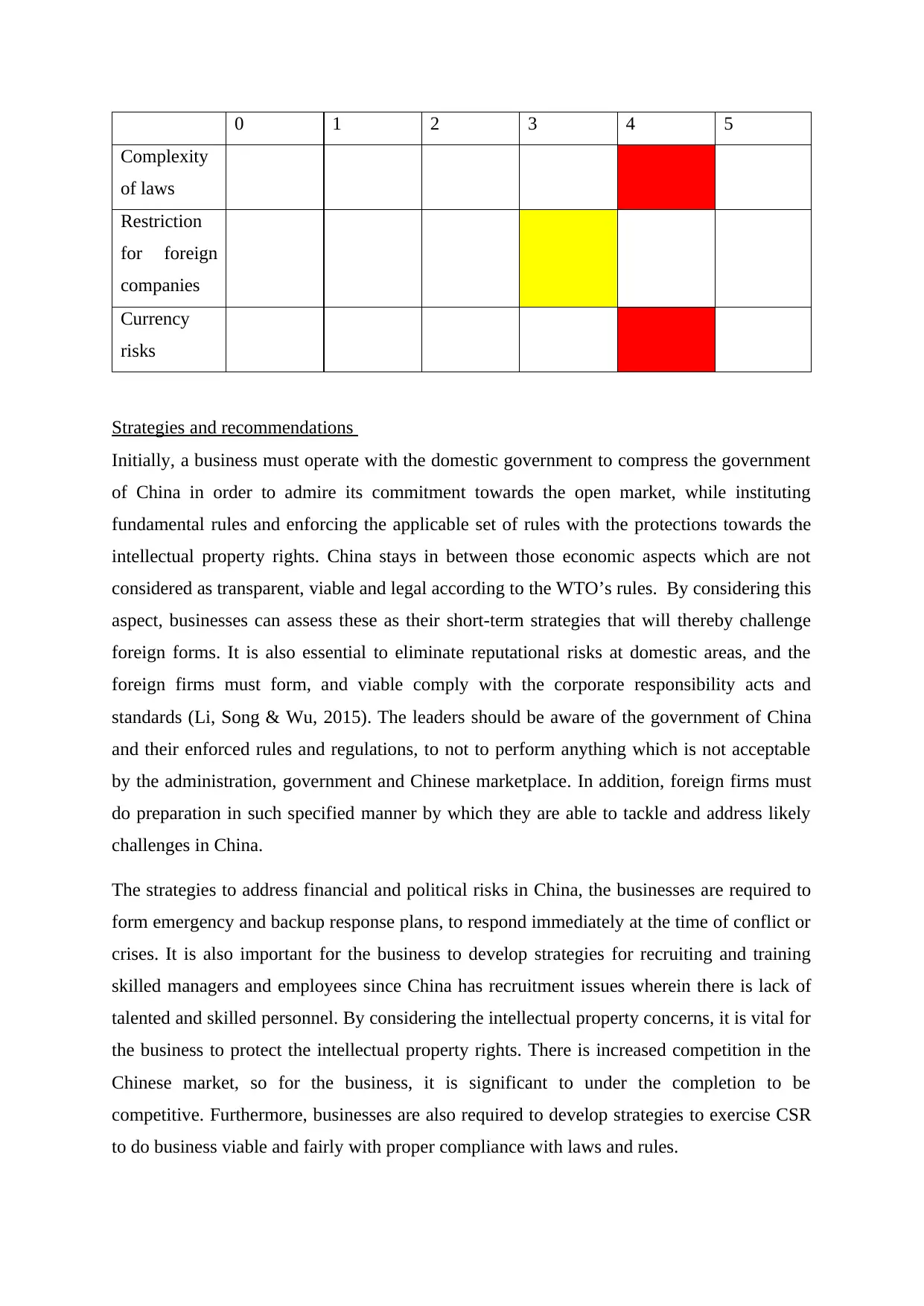
0 1 2 3 4 5
Complexity
of laws
Restriction
for foreign
companies
Currency
risks
Strategies and recommendations
Initially, a business must operate with the domestic government to compress the government
of China in order to admire its commitment towards the open market, while instituting
fundamental rules and enforcing the applicable set of rules with the protections towards the
intellectual property rights. China stays in between those economic aspects which are not
considered as transparent, viable and legal according to the WTO’s rules. By considering this
aspect, businesses can assess these as their short-term strategies that will thereby challenge
foreign forms. It is also essential to eliminate reputational risks at domestic areas, and the
foreign firms must form, and viable comply with the corporate responsibility acts and
standards (Li, Song & Wu, 2015). The leaders should be aware of the government of China
and their enforced rules and regulations, to not to perform anything which is not acceptable
by the administration, government and Chinese marketplace. In addition, foreign firms must
do preparation in such specified manner by which they are able to tackle and address likely
challenges in China.
The strategies to address financial and political risks in China, the businesses are required to
form emergency and backup response plans, to respond immediately at the time of conflict or
crises. It is also important for the business to develop strategies for recruiting and training
skilled managers and employees since China has recruitment issues wherein there is lack of
talented and skilled personnel. By considering the intellectual property concerns, it is vital for
the business to protect the intellectual property rights. There is increased competition in the
Chinese market, so for the business, it is significant to under the completion to be
competitive. Furthermore, businesses are also required to develop strategies to exercise CSR
to do business viable and fairly with proper compliance with laws and rules.
Complexity
of laws
Restriction
for foreign
companies
Currency
risks
Strategies and recommendations
Initially, a business must operate with the domestic government to compress the government
of China in order to admire its commitment towards the open market, while instituting
fundamental rules and enforcing the applicable set of rules with the protections towards the
intellectual property rights. China stays in between those economic aspects which are not
considered as transparent, viable and legal according to the WTO’s rules. By considering this
aspect, businesses can assess these as their short-term strategies that will thereby challenge
foreign forms. It is also essential to eliminate reputational risks at domestic areas, and the
foreign firms must form, and viable comply with the corporate responsibility acts and
standards (Li, Song & Wu, 2015). The leaders should be aware of the government of China
and their enforced rules and regulations, to not to perform anything which is not acceptable
by the administration, government and Chinese marketplace. In addition, foreign firms must
do preparation in such specified manner by which they are able to tackle and address likely
challenges in China.
The strategies to address financial and political risks in China, the businesses are required to
form emergency and backup response plans, to respond immediately at the time of conflict or
crises. It is also important for the business to develop strategies for recruiting and training
skilled managers and employees since China has recruitment issues wherein there is lack of
talented and skilled personnel. By considering the intellectual property concerns, it is vital for
the business to protect the intellectual property rights. There is increased competition in the
Chinese market, so for the business, it is significant to under the completion to be
competitive. Furthermore, businesses are also required to develop strategies to exercise CSR
to do business viable and fairly with proper compliance with laws and rules.
⊘ This is a preview!⊘
Do you want full access?
Subscribe today to unlock all pages.

Trusted by 1+ million students worldwide

For conducting business in China with no interruptions and risks of politics and economy, it
is essential for a business to take profession and legal advice and consider the activities to do
business. Businesses must get referral lists of the firm's based ion China to have records
thereby keeping the business on track from the very beginning (Gilboy, 2016). Companies
attempting to make their initial investments in the country or are willing to expand their
business should be completely aware of the risks to conduct business in China, with proper
preparation to take suitable steps to mitigate these risks. For the businesses, they must get
insights regarding the operations of the business in China, which can result beneficial to learn
in better management of financial and political risks.
Turkey
Turkey is said to the world’s largest economy ranked on the 18th position. It is predicted to be
ranked as the 10th position by 2023 it possesses the youngest and the rapidly increasing
population in Europe. Turkey is expected to an experience ongoing risks that are faced at the
time of 2017 that is civil unrest, not-settled economy; continual threats occurred due to
terrorist groups and foreign policy forces. Inflation continued to stay at the top and was
assumed at the 10.9% during 2017, attaining double-digits in the 9 years for the first time
(Nudrali & O’Reilly, 2016). Inflation is likely to stay as high in 2018 because of increased
demand, high-cost pressure and increasing expectations of inflation put forth on the pressure.
The interest rate of the central bank in Turkey has been increased by 500 bps during 2017,
which is inadequate to include inflation. Moreover, requirements of foreign finance stay as
showing a deficit in the large current account, which is likely to remain above 5% of gross
domestic product in 2018. With the programming of fiscal stimulus to be taken back in 2018
that is rising of the corporate tax rate by 2 points to 22 percentages by 2020 and continued to
be local and domestic risks, growth is likely to transform in 2018.
Turkey has offered key opportunities during the period of poor growth in the international
economy. The political and economic stability of the country is greatly vulnerable
uncertainties, whereas its protection has experienced increasing threats from local Islamist
terrorists. Good investors are those who are able to gain a better understanding of the
relationship among their sectors, regional partners and policies, allowing them to control their
exposure to the upcoming crises within the country.
On the other hand, Turkey has increased instability in politics and a rigid regional business
landscape which creates high barriers for the business and foreign investors to enter (Bekaert,
is essential for a business to take profession and legal advice and consider the activities to do
business. Businesses must get referral lists of the firm's based ion China to have records
thereby keeping the business on track from the very beginning (Gilboy, 2016). Companies
attempting to make their initial investments in the country or are willing to expand their
business should be completely aware of the risks to conduct business in China, with proper
preparation to take suitable steps to mitigate these risks. For the businesses, they must get
insights regarding the operations of the business in China, which can result beneficial to learn
in better management of financial and political risks.
Turkey
Turkey is said to the world’s largest economy ranked on the 18th position. It is predicted to be
ranked as the 10th position by 2023 it possesses the youngest and the rapidly increasing
population in Europe. Turkey is expected to an experience ongoing risks that are faced at the
time of 2017 that is civil unrest, not-settled economy; continual threats occurred due to
terrorist groups and foreign policy forces. Inflation continued to stay at the top and was
assumed at the 10.9% during 2017, attaining double-digits in the 9 years for the first time
(Nudrali & O’Reilly, 2016). Inflation is likely to stay as high in 2018 because of increased
demand, high-cost pressure and increasing expectations of inflation put forth on the pressure.
The interest rate of the central bank in Turkey has been increased by 500 bps during 2017,
which is inadequate to include inflation. Moreover, requirements of foreign finance stay as
showing a deficit in the large current account, which is likely to remain above 5% of gross
domestic product in 2018. With the programming of fiscal stimulus to be taken back in 2018
that is rising of the corporate tax rate by 2 points to 22 percentages by 2020 and continued to
be local and domestic risks, growth is likely to transform in 2018.
Turkey has offered key opportunities during the period of poor growth in the international
economy. The political and economic stability of the country is greatly vulnerable
uncertainties, whereas its protection has experienced increasing threats from local Islamist
terrorists. Good investors are those who are able to gain a better understanding of the
relationship among their sectors, regional partners and policies, allowing them to control their
exposure to the upcoming crises within the country.
On the other hand, Turkey has increased instability in politics and a rigid regional business
landscape which creates high barriers for the business and foreign investors to enter (Bekaert,
Paraphrase This Document
Need a fresh take? Get an instant paraphrase of this document with our AI Paraphraser
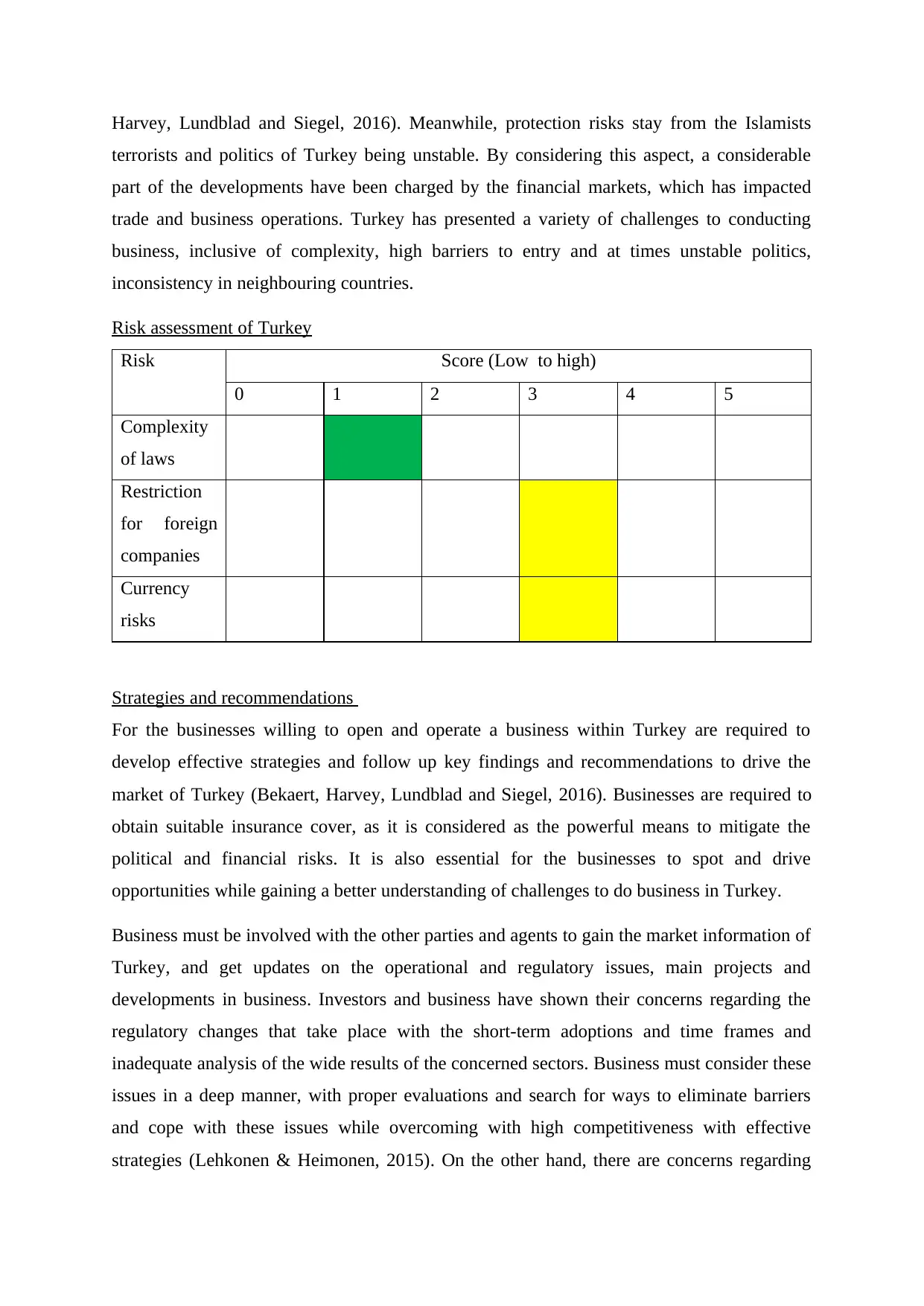
Harvey, Lundblad and Siegel, 2016). Meanwhile, protection risks stay from the Islamists
terrorists and politics of Turkey being unstable. By considering this aspect, a considerable
part of the developments have been charged by the financial markets, which has impacted
trade and business operations. Turkey has presented a variety of challenges to conducting
business, inclusive of complexity, high barriers to entry and at times unstable politics,
inconsistency in neighbouring countries.
Risk assessment of Turkey
Risk Score (Low to high)
0 1 2 3 4 5
Complexity
of laws
Restriction
for foreign
companies
Currency
risks
Strategies and recommendations
For the businesses willing to open and operate a business within Turkey are required to
develop effective strategies and follow up key findings and recommendations to drive the
market of Turkey (Bekaert, Harvey, Lundblad and Siegel, 2016). Businesses are required to
obtain suitable insurance cover, as it is considered as the powerful means to mitigate the
political and financial risks. It is also essential for the businesses to spot and drive
opportunities while gaining a better understanding of challenges to do business in Turkey.
Business must be involved with the other parties and agents to gain the market information of
Turkey, and get updates on the operational and regulatory issues, main projects and
developments in business. Investors and business have shown their concerns regarding the
regulatory changes that take place with the short-term adoptions and time frames and
inadequate analysis of the wide results of the concerned sectors. Business must consider these
issues in a deep manner, with proper evaluations and search for ways to eliminate barriers
and cope with these issues while overcoming with high competitiveness with effective
strategies (Lehkonen & Heimonen, 2015). On the other hand, there are concerns regarding
terrorists and politics of Turkey being unstable. By considering this aspect, a considerable
part of the developments have been charged by the financial markets, which has impacted
trade and business operations. Turkey has presented a variety of challenges to conducting
business, inclusive of complexity, high barriers to entry and at times unstable politics,
inconsistency in neighbouring countries.
Risk assessment of Turkey
Risk Score (Low to high)
0 1 2 3 4 5
Complexity
of laws
Restriction
for foreign
companies
Currency
risks
Strategies and recommendations
For the businesses willing to open and operate a business within Turkey are required to
develop effective strategies and follow up key findings and recommendations to drive the
market of Turkey (Bekaert, Harvey, Lundblad and Siegel, 2016). Businesses are required to
obtain suitable insurance cover, as it is considered as the powerful means to mitigate the
political and financial risks. It is also essential for the businesses to spot and drive
opportunities while gaining a better understanding of challenges to do business in Turkey.
Business must be involved with the other parties and agents to gain the market information of
Turkey, and get updates on the operational and regulatory issues, main projects and
developments in business. Investors and business have shown their concerns regarding the
regulatory changes that take place with the short-term adoptions and time frames and
inadequate analysis of the wide results of the concerned sectors. Business must consider these
issues in a deep manner, with proper evaluations and search for ways to eliminate barriers
and cope with these issues while overcoming with high competitiveness with effective
strategies (Lehkonen & Heimonen, 2015). On the other hand, there are concerns regarding
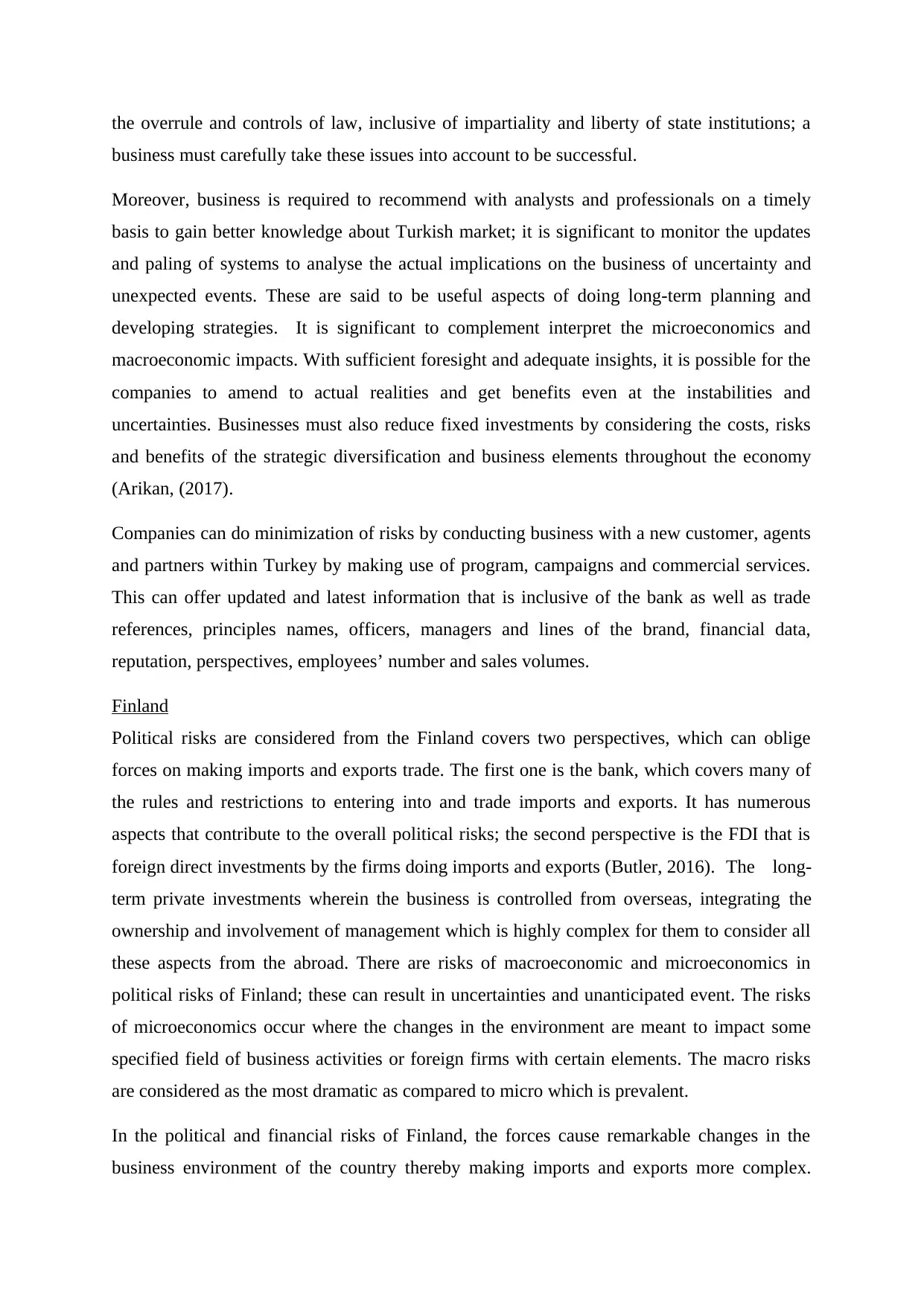
the overrule and controls of law, inclusive of impartiality and liberty of state institutions; a
business must carefully take these issues into account to be successful.
Moreover, business is required to recommend with analysts and professionals on a timely
basis to gain better knowledge about Turkish market; it is significant to monitor the updates
and paling of systems to analyse the actual implications on the business of uncertainty and
unexpected events. These are said to be useful aspects of doing long-term planning and
developing strategies. It is significant to complement interpret the microeconomics and
macroeconomic impacts. With sufficient foresight and adequate insights, it is possible for the
companies to amend to actual realities and get benefits even at the instabilities and
uncertainties. Businesses must also reduce fixed investments by considering the costs, risks
and benefits of the strategic diversification and business elements throughout the economy
(Arikan, (2017).
Companies can do minimization of risks by conducting business with a new customer, agents
and partners within Turkey by making use of program, campaigns and commercial services.
This can offer updated and latest information that is inclusive of the bank as well as trade
references, principles names, officers, managers and lines of the brand, financial data,
reputation, perspectives, employees’ number and sales volumes.
Finland
Political risks are considered from the Finland covers two perspectives, which can oblige
forces on making imports and exports trade. The first one is the bank, which covers many of
the rules and restrictions to entering into and trade imports and exports. It has numerous
aspects that contribute to the overall political risks; the second perspective is the FDI that is
foreign direct investments by the firms doing imports and exports (Butler, 2016). The long-
term private investments wherein the business is controlled from overseas, integrating the
ownership and involvement of management which is highly complex for them to consider all
these aspects from the abroad. There are risks of macroeconomic and microeconomics in
political risks of Finland; these can result in uncertainties and unanticipated event. The risks
of microeconomics occur where the changes in the environment are meant to impact some
specified field of business activities or foreign firms with certain elements. The macro risks
are considered as the most dramatic as compared to micro which is prevalent.
In the political and financial risks of Finland, the forces cause remarkable changes in the
business environment of the country thereby making imports and exports more complex.
business must carefully take these issues into account to be successful.
Moreover, business is required to recommend with analysts and professionals on a timely
basis to gain better knowledge about Turkish market; it is significant to monitor the updates
and paling of systems to analyse the actual implications on the business of uncertainty and
unexpected events. These are said to be useful aspects of doing long-term planning and
developing strategies. It is significant to complement interpret the microeconomics and
macroeconomic impacts. With sufficient foresight and adequate insights, it is possible for the
companies to amend to actual realities and get benefits even at the instabilities and
uncertainties. Businesses must also reduce fixed investments by considering the costs, risks
and benefits of the strategic diversification and business elements throughout the economy
(Arikan, (2017).
Companies can do minimization of risks by conducting business with a new customer, agents
and partners within Turkey by making use of program, campaigns and commercial services.
This can offer updated and latest information that is inclusive of the bank as well as trade
references, principles names, officers, managers and lines of the brand, financial data,
reputation, perspectives, employees’ number and sales volumes.
Finland
Political risks are considered from the Finland covers two perspectives, which can oblige
forces on making imports and exports trade. The first one is the bank, which covers many of
the rules and restrictions to entering into and trade imports and exports. It has numerous
aspects that contribute to the overall political risks; the second perspective is the FDI that is
foreign direct investments by the firms doing imports and exports (Butler, 2016). The long-
term private investments wherein the business is controlled from overseas, integrating the
ownership and involvement of management which is highly complex for them to consider all
these aspects from the abroad. There are risks of macroeconomic and microeconomics in
political risks of Finland; these can result in uncertainties and unanticipated event. The risks
of microeconomics occur where the changes in the environment are meant to impact some
specified field of business activities or foreign firms with certain elements. The macro risks
are considered as the most dramatic as compared to micro which is prevalent.
In the political and financial risks of Finland, the forces cause remarkable changes in the
business environment of the country thereby making imports and exports more complex.
⊘ This is a preview!⊘
Do you want full access?
Subscribe today to unlock all pages.

Trusted by 1+ million students worldwide
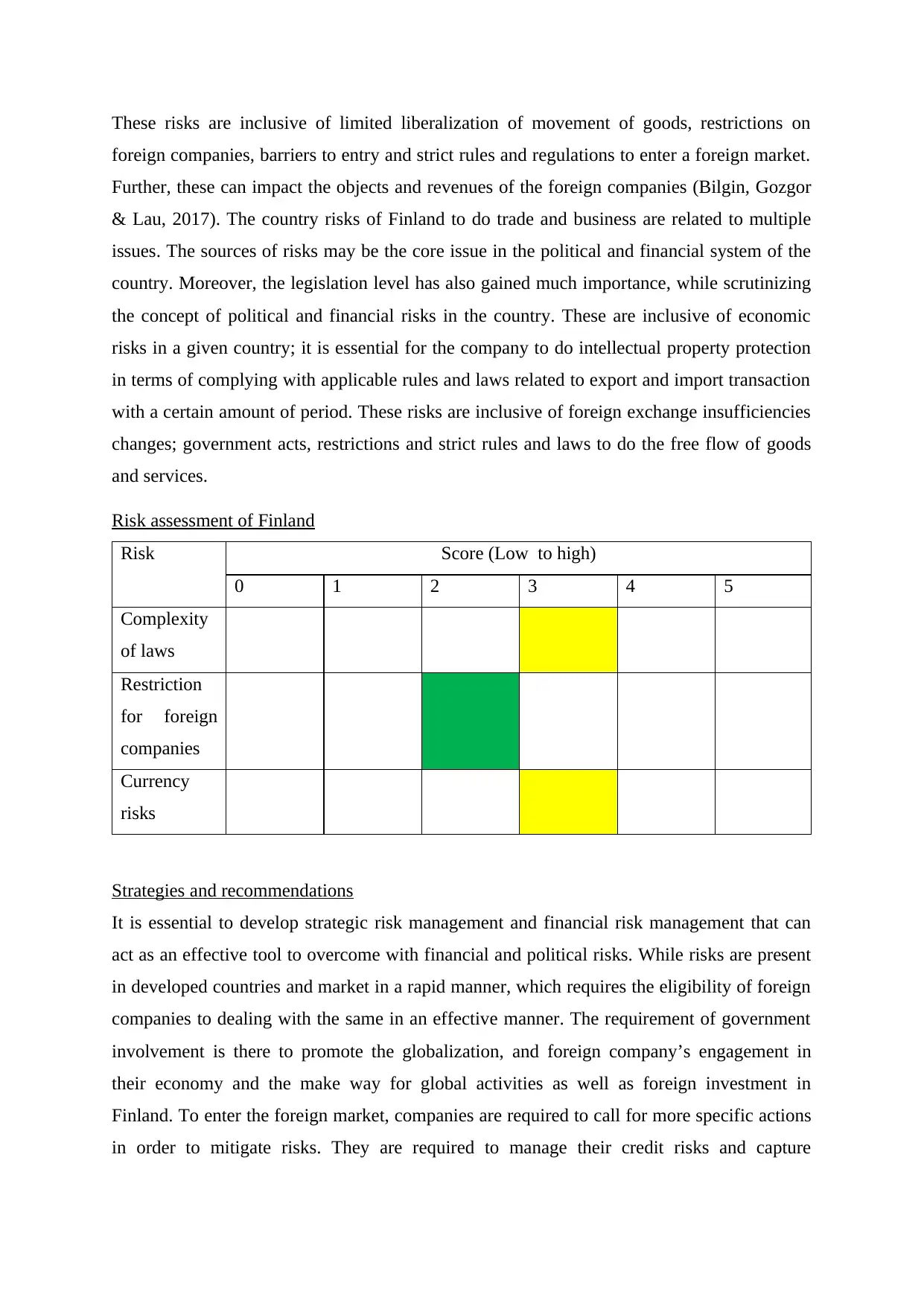
These risks are inclusive of limited liberalization of movement of goods, restrictions on
foreign companies, barriers to entry and strict rules and regulations to enter a foreign market.
Further, these can impact the objects and revenues of the foreign companies (Bilgin, Gozgor
& Lau, 2017). The country risks of Finland to do trade and business are related to multiple
issues. The sources of risks may be the core issue in the political and financial system of the
country. Moreover, the legislation level has also gained much importance, while scrutinizing
the concept of political and financial risks in the country. These are inclusive of economic
risks in a given country; it is essential for the company to do intellectual property protection
in terms of complying with applicable rules and laws related to export and import transaction
with a certain amount of period. These risks are inclusive of foreign exchange insufficiencies
changes; government acts, restrictions and strict rules and laws to do the free flow of goods
and services.
Risk assessment of Finland
Risk Score (Low to high)
0 1 2 3 4 5
Complexity
of laws
Restriction
for foreign
companies
Currency
risks
Strategies and recommendations
It is essential to develop strategic risk management and financial risk management that can
act as an effective tool to overcome with financial and political risks. While risks are present
in developed countries and market in a rapid manner, which requires the eligibility of foreign
companies to dealing with the same in an effective manner. The requirement of government
involvement is there to promote the globalization, and foreign company’s engagement in
their economy and the make way for global activities as well as foreign investment in
Finland. To enter the foreign market, companies are required to call for more specific actions
in order to mitigate risks. They are required to manage their credit risks and capture
foreign companies, barriers to entry and strict rules and regulations to enter a foreign market.
Further, these can impact the objects and revenues of the foreign companies (Bilgin, Gozgor
& Lau, 2017). The country risks of Finland to do trade and business are related to multiple
issues. The sources of risks may be the core issue in the political and financial system of the
country. Moreover, the legislation level has also gained much importance, while scrutinizing
the concept of political and financial risks in the country. These are inclusive of economic
risks in a given country; it is essential for the company to do intellectual property protection
in terms of complying with applicable rules and laws related to export and import transaction
with a certain amount of period. These risks are inclusive of foreign exchange insufficiencies
changes; government acts, restrictions and strict rules and laws to do the free flow of goods
and services.
Risk assessment of Finland
Risk Score (Low to high)
0 1 2 3 4 5
Complexity
of laws
Restriction
for foreign
companies
Currency
risks
Strategies and recommendations
It is essential to develop strategic risk management and financial risk management that can
act as an effective tool to overcome with financial and political risks. While risks are present
in developed countries and market in a rapid manner, which requires the eligibility of foreign
companies to dealing with the same in an effective manner. The requirement of government
involvement is there to promote the globalization, and foreign company’s engagement in
their economy and the make way for global activities as well as foreign investment in
Finland. To enter the foreign market, companies are required to call for more specific actions
in order to mitigate risks. They are required to manage their credit risks and capture
Paraphrase This Document
Need a fresh take? Get an instant paraphrase of this document with our AI Paraphraser
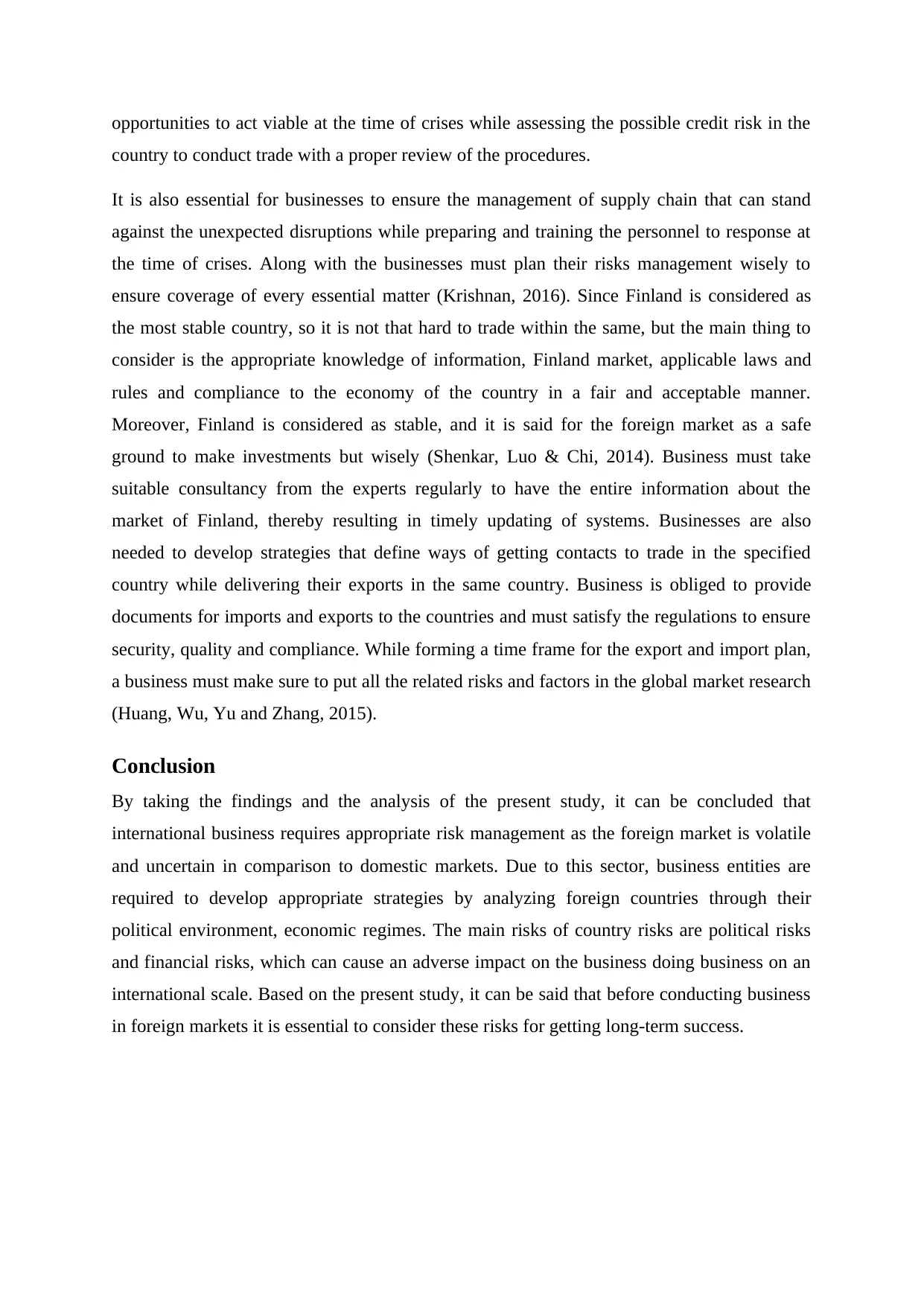
opportunities to act viable at the time of crises while assessing the possible credit risk in the
country to conduct trade with a proper review of the procedures.
It is also essential for businesses to ensure the management of supply chain that can stand
against the unexpected disruptions while preparing and training the personnel to response at
the time of crises. Along with the businesses must plan their risks management wisely to
ensure coverage of every essential matter (Krishnan, 2016). Since Finland is considered as
the most stable country, so it is not that hard to trade within the same, but the main thing to
consider is the appropriate knowledge of information, Finland market, applicable laws and
rules and compliance to the economy of the country in a fair and acceptable manner.
Moreover, Finland is considered as stable, and it is said for the foreign market as a safe
ground to make investments but wisely (Shenkar, Luo & Chi, 2014). Business must take
suitable consultancy from the experts regularly to have the entire information about the
market of Finland, thereby resulting in timely updating of systems. Businesses are also
needed to develop strategies that define ways of getting contacts to trade in the specified
country while delivering their exports in the same country. Business is obliged to provide
documents for imports and exports to the countries and must satisfy the regulations to ensure
security, quality and compliance. While forming a time frame for the export and import plan,
a business must make sure to put all the related risks and factors in the global market research
(Huang, Wu, Yu and Zhang, 2015).
Conclusion
By taking the findings and the analysis of the present study, it can be concluded that
international business requires appropriate risk management as the foreign market is volatile
and uncertain in comparison to domestic markets. Due to this sector, business entities are
required to develop appropriate strategies by analyzing foreign countries through their
political environment, economic regimes. The main risks of country risks are political risks
and financial risks, which can cause an adverse impact on the business doing business on an
international scale. Based on the present study, it can be said that before conducting business
in foreign markets it is essential to consider these risks for getting long-term success.
country to conduct trade with a proper review of the procedures.
It is also essential for businesses to ensure the management of supply chain that can stand
against the unexpected disruptions while preparing and training the personnel to response at
the time of crises. Along with the businesses must plan their risks management wisely to
ensure coverage of every essential matter (Krishnan, 2016). Since Finland is considered as
the most stable country, so it is not that hard to trade within the same, but the main thing to
consider is the appropriate knowledge of information, Finland market, applicable laws and
rules and compliance to the economy of the country in a fair and acceptable manner.
Moreover, Finland is considered as stable, and it is said for the foreign market as a safe
ground to make investments but wisely (Shenkar, Luo & Chi, 2014). Business must take
suitable consultancy from the experts regularly to have the entire information about the
market of Finland, thereby resulting in timely updating of systems. Businesses are also
needed to develop strategies that define ways of getting contacts to trade in the specified
country while delivering their exports in the same country. Business is obliged to provide
documents for imports and exports to the countries and must satisfy the regulations to ensure
security, quality and compliance. While forming a time frame for the export and import plan,
a business must make sure to put all the related risks and factors in the global market research
(Huang, Wu, Yu and Zhang, 2015).
Conclusion
By taking the findings and the analysis of the present study, it can be concluded that
international business requires appropriate risk management as the foreign market is volatile
and uncertain in comparison to domestic markets. Due to this sector, business entities are
required to develop appropriate strategies by analyzing foreign countries through their
political environment, economic regimes. The main risks of country risks are political risks
and financial risks, which can cause an adverse impact on the business doing business on an
international scale. Based on the present study, it can be said that before conducting business
in foreign markets it is essential to consider these risks for getting long-term success.

References
Arikan, H. (2017). Turkey and the EU: an awkward candidate for EU membership?.
Routledge.
Bekaert, G., Harvey, C. R., Lundblad, C. T., & Siegel, S. (2014). Political risk
spreads. Journal of International Business Studies, 45(4), 471-493.
Bekaert, G., Harvey, C. R., Lundblad, C. T., & Siegel, S. (2016). Political risk and
international valuation. Journal of Corporate Finance, 37, 1-23.
Bilgin, M. H., Gozgor, G., & Lau, C. K. M. (2017). Institutions and gravity model: the role of
political economy and corporate governance. Eurasian Business Review, 7(3), 421-
436.
Breslin, S. (2016). China and the global political economy. Springer.
Brink, C. H. (2017). Measuring political risk: risks to foreign investment. Routledge.
Butler, K. C. (2016). Multinational Finance: Evaluating the Opportunities, Costs, and Risks
of Multinational Operations. John Wiley & Sons.
Cavusgil, S. T., Knight, G., Riesenberger, J. R., Rammal, H. G., & Rose, E. L.
(2014). International business. Pearson Australia.
Deresky, H. (2017). International management: Managing across borders and cultures.
Pearson Education India.
Gilboy, G. J. (2016). The myth behind China's miracle. In SEEKING CHANGES: The
Economic Development in Contemporary China (pp. 1-16).
Huang, T., Wu, F., Yu, J., & Zhang, B. (2015). Political risk and dividend policy: Evidence
from international political crises. Journal of International Business Studies, 46(5),
574-595.
Krishnan, R. (2016). Energy security through a framework of country risks and
vulnerabilities. Energy Sources, Part B: Economics, Planning, and Policy, 11(1), 32-
37.
Lehkonen, H., & Heimonen, K. (2015). Democracy, political risks and stock market
performance. Journal of International Money and Finance, 59, 77-99.
Arikan, H. (2017). Turkey and the EU: an awkward candidate for EU membership?.
Routledge.
Bekaert, G., Harvey, C. R., Lundblad, C. T., & Siegel, S. (2014). Political risk
spreads. Journal of International Business Studies, 45(4), 471-493.
Bekaert, G., Harvey, C. R., Lundblad, C. T., & Siegel, S. (2016). Political risk and
international valuation. Journal of Corporate Finance, 37, 1-23.
Bilgin, M. H., Gozgor, G., & Lau, C. K. M. (2017). Institutions and gravity model: the role of
political economy and corporate governance. Eurasian Business Review, 7(3), 421-
436.
Breslin, S. (2016). China and the global political economy. Springer.
Brink, C. H. (2017). Measuring political risk: risks to foreign investment. Routledge.
Butler, K. C. (2016). Multinational Finance: Evaluating the Opportunities, Costs, and Risks
of Multinational Operations. John Wiley & Sons.
Cavusgil, S. T., Knight, G., Riesenberger, J. R., Rammal, H. G., & Rose, E. L.
(2014). International business. Pearson Australia.
Deresky, H. (2017). International management: Managing across borders and cultures.
Pearson Education India.
Gilboy, G. J. (2016). The myth behind China's miracle. In SEEKING CHANGES: The
Economic Development in Contemporary China (pp. 1-16).
Huang, T., Wu, F., Yu, J., & Zhang, B. (2015). Political risk and dividend policy: Evidence
from international political crises. Journal of International Business Studies, 46(5),
574-595.
Krishnan, R. (2016). Energy security through a framework of country risks and
vulnerabilities. Energy Sources, Part B: Economics, Planning, and Policy, 11(1), 32-
37.
Lehkonen, H., & Heimonen, K. (2015). Democracy, political risks and stock market
performance. Journal of International Money and Finance, 59, 77-99.
⊘ This is a preview!⊘
Do you want full access?
Subscribe today to unlock all pages.

Trusted by 1+ million students worldwide
1 out of 13
Related Documents
Your All-in-One AI-Powered Toolkit for Academic Success.
+13062052269
info@desklib.com
Available 24*7 on WhatsApp / Email
![[object Object]](/_next/static/media/star-bottom.7253800d.svg)
Unlock your academic potential
Copyright © 2020–2025 A2Z Services. All Rights Reserved. Developed and managed by ZUCOL.




